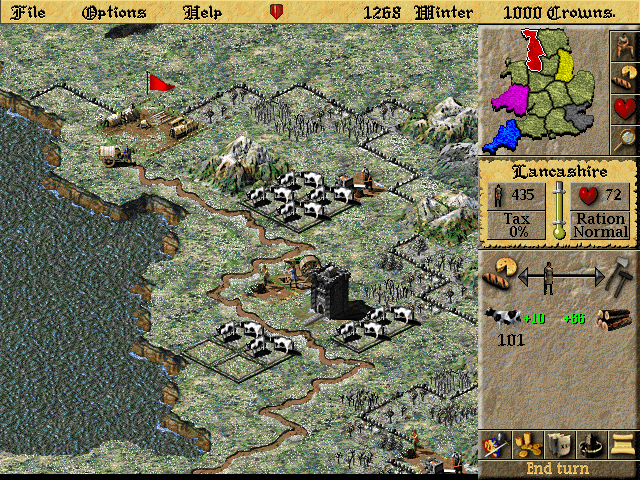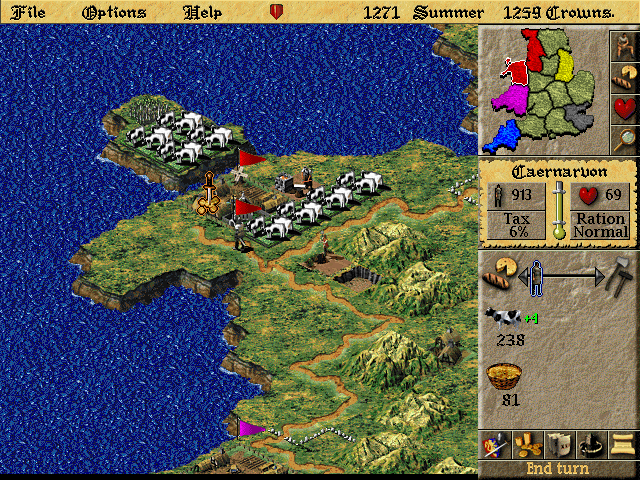Lords Of The Realm 2 is my gaming equivalent of comfort food. It might not have awards or hype buzzing around it, but it is always the perfect choice for a rainy day when I’m feeling restless. I’ve played and replayed it many times. Currently I own it on Steam.
The game was developed by the British studio Impressions Games. If you have played other titles by the studio such as the Caesar games, Pharaoh, or Civil War General games then the style and sensibilities of this game will feel instantly familiar.

Mechanically it is similar to the Total War series. There is a turn based overworld map where resources, production, construction, and army movements can be controlled; and then there are real time combat portions where field battles and sieges can be directed. However Lords Of The Realm 2 was released in 1996, itself a sequel to the first game that was released in 1994, far predates the Total War series. Rather than modern, clean 3D graphics the game has a more classic animated style to it.

The battlefields are viewed directly from overhead, rather than an isometric or oblique cavalier perspective, and soldiers do not move in prearranged formations but are dragged and selected in a style closer to a traditional real time strategy game.
The overworld map is divided into counties. By default the game is set in Britain, but a player can choose alternate scenarios such Ireland, Scotland, Italy, France, or all of Europe (with each country of the smaller scenarios representing a single county). There are also options such as China and India. There are even abstract formations of land to fight over. No matter what is chosen the visuals never change from the appearance and style of medieval Britain.

To conquer a county on the map the town center must be taken, or if there is a castle it must be sieged and overrun. Unaligned counties are easy pickings, fielding only peasants supported by a small hodgepodge of archers and macemen. Counties under control of enemy factions tend to be tougher, usually with their garrison inside of a castle. To crack a castle, the attacking army must commit to a multi-turn siege where it builds siege engines capable of either battering down the gates, smashing the walls, or allowing troops to scale over top.

The game has five possible castle types, which can be build in either an ascending order, or chosen from if the player has enough resources to build a better one right off the bat. Each castle in order is obviously clearly better than the preceding castle, although any castle in a county is better than one at all.

With counties under control, the taxes, food production, and resources must be managed from the town center. Paying attention to county happiness is vital. A county which becomes too unhappy for too long will revolt from control of the player, requiring force to retake, and in the process killing the villagers who make up the work force. Positive factors like increased rations, good health, or lower taxes will make a county happier while alternates like cut rations, plague, high taxes, or military recruitment from the county will lower it.

Building armies is done by recruiting from individual counties. In the recruitment screen troops can be assigned weapons from the armory. If no weapon is assigned, troops are unarmored peasants with pitchforks, the weakest but cheapest type of unit in the game. Solid early game choices are maces, which are cheap to make but significantly improve peasents to make them good all around melee troops. Archers are good for defending castle walls. Pikemen are good in theory, but the game doesn’t have the kind of options to consistly get them in good formations around units in need of protection. Later game crossbowmen are like slower firing but more powerful archers. They are a good counter to the swordsmen and expensive, but all around powerful knights. In addition to recruiting, sometimes there will be an opportunity to hire mercenaries. If money is available, mercenaries are almost always a good choice. Their recruitment doesn’t lower county morale. The only downside is that two different groups of mercenaries can not exist in a single army.

The AI opponents in control of the opposing factions are all colorful and appropriate to the tone. There is a haughty Countess, a sneering Bishop, a boisterous Knight, and a tired Baron vying for control of the map against me. I can send compliments or insults. Truly in many years I have never figured out if they have any effect, because even raising an AI’s disposition high enough to sign a treaty with them seems meaningless. If the AI decides it wants my territory, a treaty doesn’t even seem to slow it down. The different AIs might be programmed with different leadership styles by I can barely tell. The only tactic that stands out is the Knight’s habit of raising small peasant armies for the purpose of burning my crops and harassing my countryside. No matter, even if all the rest of the opponents are mechanically the same, their voice acting and lines makes me uniquely despise them, and motivates me to smash every last castle they own.

The audio is a huge factor in this game’s charm. The ambient music is a constant calming stream pipes and lutes that could have come straight from a renaissance fair. In the overworld cows will moo when clicked on. Blacksmiths shops will have the sound of hammering metal. In battle every unit will give a gruff reply when given an order. Men scream as castle defenders dump boiling oil onto them. The game is just alive with the sounds of an exaggerated, almost storybook like perception of the middle ages.
I recommend this game to anyone was wants a strategy game that isn’t overly demanding or stressful. A playthrough can easily be completed in a single evening. The mechanics may be dated, but they are rock solid, and the art style is timeless.
Post on my blog. (I have other stuff too!)


Sir Johnny of Concrete, the 'ardest man in thine Kingdom.